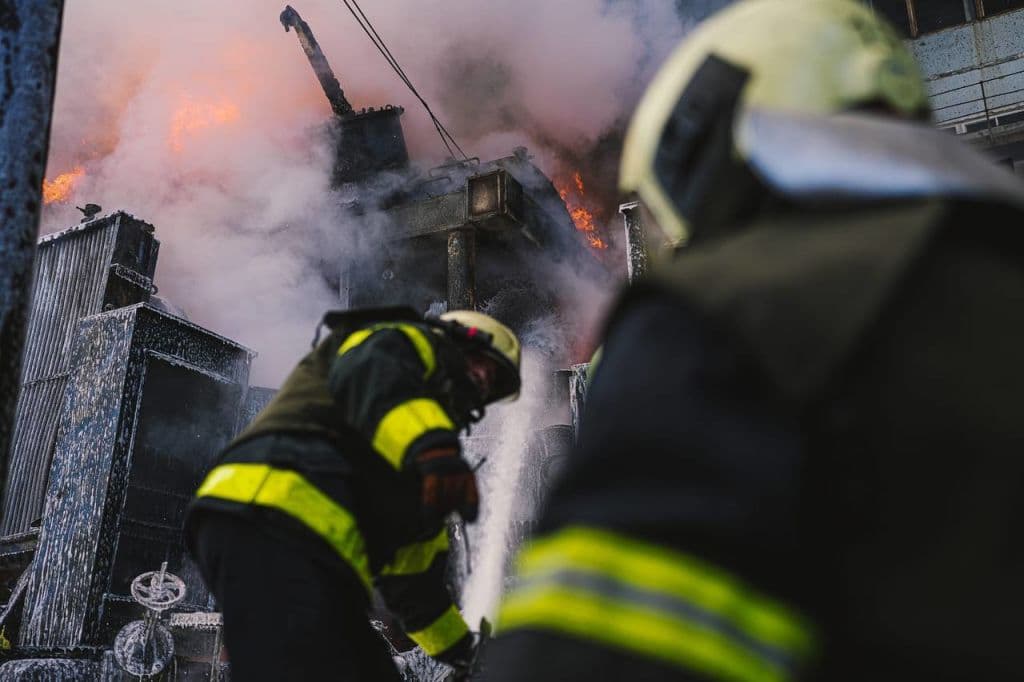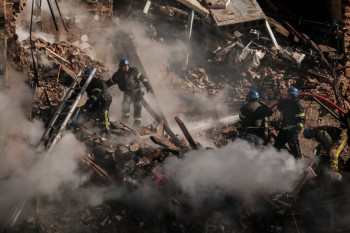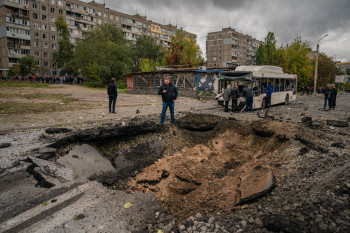Intensified Russian attacks on Ukraine infrastructure unlikely to achieve Kremlin's goals

Massive Russian missile and drone attacks on Kyiv and energy infrastructure all over Ukraine are becoming a regular occurrence.
One apparent aim of Russian attacks on energy and civilian infrastructure is to bully Ukraine's population into submission.
On Oct. 19, President Volodymyr Zelensky didn't rule out a potential failure of Ukraine's electricity system. According to the President's Office, the Ukrainian leadership is preparing for "a number of different scenarios" after over a week of Russian missile and drone strikes on electricity facilities across the country.
Experts believe that Russian dictator Vladimir Putin is also trying to slow down the Ukrainian counteroffensive by attacking the rear. Meduza, a Russian independent news outlet, reported that Putin is planning a new offensive in 2023 after newly conscripted Russians reach the front line.
But so far, the strategy does not appear to be working. Ten days after the first major attack on Kyiv in months, there are no signs that Ukrainian public opinion is changing in favor of a peace deal with Russia.
Military experts also add that the attacks have little impact on the situation on the battlefield.
"It doesn't affect the Armed Forces," Ukrainian military expert Vyacheslav Tseluiko told the Kyiv Independent.
Continuous strikes
On Oct. 10, Russia attacked Ukraine with 84 missiles and 24 Iranian-made Shahed-136 drones in one of the largest coordinated missile attacks since the full-scale invasion began on Feb. 24.
At least 19 people, including eight in Kyiv, were killed.
Russia also continued attacking energy infrastructure in different cities.
On Oct. 17, Russia attacked Ukrainian cities with 43 drones. Russia used 28 drones to attack Kyiv, where a residential building was destroyed. At least five people were killed.
Only half of the missiles targeting Ukraine were shot down on Oct. 10, but most of the drones were downed on Oct. 17.
The attacks on Kyiv continued on Oct. 18, when a Russian missile attack on the city's energy infrastructure killed three people, and Oct. 19, when "several missiles" were shot down by air defense, according to the city authorities.
The newly provided German IRIS-T surface-to-air system appeared to be defending Kyiv. Zelensky said the air defense systems were effective and "performed very well."
Effects of attacks
The Russian attacks have already had a significant impact on Ukraine's energy infrastructure.
Zelensky said on Oct. 18 that Russia had destroyed 30% of Ukraine's power stations since Oct. 10. Blackouts in Ukrainian cities have become regular.
Some interpret the attacks to mean that the Kremlin is hoping that Ukraine will be too busy handling a humanitarian catastrophe during the winter heating season, which will halt its counteroffensive.
Yet, military experts argue that the military effects of the Russian attacks are minimal.
"The logic of their actions is terrorist. It's a way to pressure the population," Tseluiko said.
He argued that Russia expects the Ukrainian population to get tired of the war and pressure the government to sue for peace.
The attacks triggered a big public outcry because they hit Kyiv for the first time since July, and the attacks on the capital were more massive this time.
The Kremlin aims to intimidate the residents of Kyiv, where "the population has become more relaxed, thinking that the war is far away," Tseluiko said.
Yet the recent attacks on Kyiv are less significant than the constant Russian strikes on many cities closer to the front line, Tseluiko said.
The assault will not have the desired effect because Ukrainians have already experienced eight months of all-out war, according to Tseluiko.
"It's like a pinprick," he said. "Ukraine already has immunity to this."
Running out of missiles?
One of the major consequences of the recent attacks is Russia's diminishing stockpile of missiles.
On Oct. 14, Ukrainian Defense Minister Oleksiy Reznikov said that Russia had 124 Iskander ballistic missiles left out of the 900 it had before the invasion.
He added that Russia also has 272 Kalibr cruise missiles, compared to 500 before the invasion, and 213 Kh-101 and Kh-555 cruise missiles, compared to the pre-invasion number of 444.
Although these numbers cannot be independently verified, Tseluiko agreed that Russia is running out of missiles.
Since Russian missile production is stagnating, he added that Moscow is switching to Iranian-made drones, which are much cheaper.
Tseluiko added that Russia has to choose between launching a few missiles regularly and launching many missiles but rarely.
"It's an act of desperation," he said. "They see that they're losing the war. Russia has spent a major part of its resources but has not achieved any results."
___________________________________
Note from the author:
Hello! My name is Oleg Sukhov, the guy who wrote this piece for you.
I was born in Russia and moved to Ukraine in 2014 because I couldn't stand the suffocating atmosphere of that totalitarian country. I used to think it might be possible to transform Russia into a liberal Western-oriented country. Now it's clear that it's a lost cause. But at least I can atone for the crimes of my homeland by exposing its barbaric aggression against Ukraine and providing objective and independent coverage of what is going on there. I'm also trying to contribute to Ukraine's transformation into a full-fledged Western liberal democracy strong enough to defeat Russia.
Our publication needs help from every one of you — support Ukrainian wartime journalism, become a patron of the Kyiv Independent.












